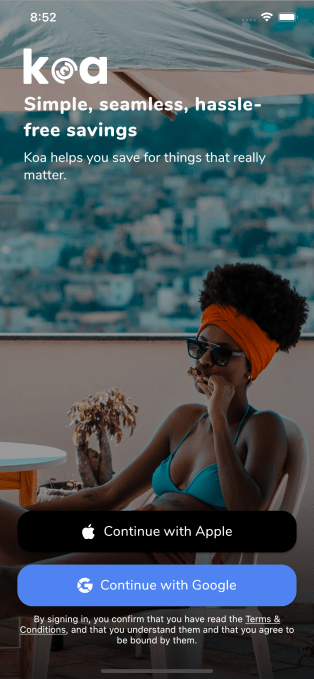While Delilah Kidanu grew up in Nairobi, Kenya, mobile money platform M-Pesa was the go-to fintech platform for her and most Kenyans.
The Safaricom-owned product provides basic access to financial services like sending and receiving money and purchasing airtime. Yet, some Kenyans still lack other digital financial services from savings to investments.
Last year, people in the country saved up to $13 billion, and more than 70% of them used informal saving groups and cooperatives to do this.
Based on her experience, Kidanu teamed up with Alexis Roman and Bubunyo Nyavor last year to start Koa to help Kenyans save and invest their money better. She is the COO of the company, while Roman and Nyavor act as the CEO and CTO, respectively.
Koa is one of 20 companies competing for $100,000 and the Disrupt cup in this week’s TechCrunch Disrupt Startup Battlefield competition.
In an interview with TechCrunch, Roman said when the team began market research to understand how Kenyans saved, they were intrigued to discover that many people were dissatisfied with the current traditional saving options.
Apart from being offline models, savings with microfinance banks, cooperatives and informal saving groups have manual, expensive and opaque processes.
“It was shocking that when we spoke to people, and they told us their experience in their cooperatives and savings groups, we wondered why they aren’t better alternatives,” Roman said. “People often use access as a keyword when describing the problem behind how financial services are used. But for us, we think access is not the problem; it is how easy or efficient it is to access the service. It was this obvious observation that made us start Koa.”
Digitally, some banks offer savings products to Kenyans. But Koa still sees an opportunity because banks are generally a less popular savings destination for an average Kenyan evident in the aforementioned stats.
The founders are banking that it will be different with Koa. Its first product is a savings app that allows consumers to deposit, save and earn interest on their money. When users log into the app, they can begin to create savings goals in different pockets, a replica of what exists offline — where they would normally save across different informal savings groups for various reasons.
But despite this huge opportunity, Koa has had to battle with two challenges.
First, infrastructure, which is a necessity for the company so it can take deposits. In Kenya, a fintech startup would typically need to partner with a financial institution. But collaboration between banks and fintech in Kenya is quite exasperating and even lags that of Nigeria, a country riddled with its own set of regulatory challenges.
The second issue Koa faced was trust, an area in which informal savings groups and cooperatives have excelled by relying on word of mouth.
That said, Koa has been able to scale past both challenges. After securing some partnerships and engaging the necessary regulatory bodies to take deposits, Koa can now make it easy for Kenyans to make deposits without having them go through the lengthy traditional KYC process.

Image Credits: Koa
Since beta launching in April 2021, the company has onboarded around 5,000 customers who use its savings product. But with savings being the lowest-hanging fruit for fintech apps, Roman says the plan for Koa is to offer more products along the line.
For one, Roman sees promise in offering embedded finance and banking-as-a-service tools that would enable startups to launch fintech products at a faster pace. And given Koa’s entry point with savings, Roman believes the company is poised to build the rails of digital financial services in the country.
Ultimately the plan is to become a digital banking platform that offers other services like lending and investments.
“While we offer direct to consumer savings apps, we can then turn around and go to other companies to help them offer savings or other financial products to their customers. They wouldn’t have to go through all the struggles and burdens through regulatory hoops if we can help them achieve that,” he said. “In the long run, we want to become a digital financial institution.”
Alongside savings, Koa also provides financial and educational content for users to help with engagement. Users on the platform have now saved more than $40,000 and Roman says the company is heading toward a double-digit growth week-on-week in both users and deposits. Koa also recently raised an undisclosed pre-seed investment from angel investors across Africa, Europe and the U.S.
Before starting Koa, Roman previously led strategy at Helium Health, one of Africa’s well-funded health tech startups. Kidanu worked with MEST Africa, a pan-African incubator and accelerator, as well as a business lead. Nyavor, on the other hand, was a serial engineering lead at various African tech companies.
“I’m bullish on our team. I’m really excited about working with these people who are all very focused on customers and how we can provide the best experience for them. I think that’s a differentiator for us in the market,” said the CEO.
Source Link Koa is helping African consumers make better money moves

Leave a Reply